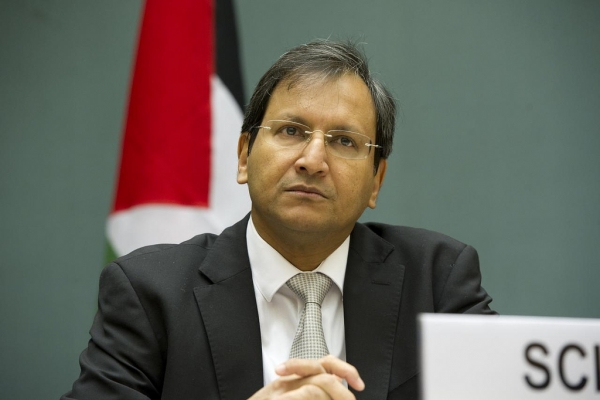Sri Lanka has called on member states of the Conference on Disarmament (CD)to seek to bring back the necessary attention at the highest political levels to the CD, in order to maintain the integrity and credibility of the Conference, as well as to create forward movement and momentum.
Sri Lanka's Permanent Representative to the UN in Geneva Ambassador Ravinatha Aryasinha made this call today (23rd January) on the occasion of Sri Lanka assuming the responsibility of the CD as its first President of the 2018 session. Sri Lanka assumes the Presidency of the CD after 11 years.
Addressing the plenary, Ambassador Aryasinha noted that Sri Lanka assumes the Presidency of the Conference "at a time this august body has critical challenges and some opportunities before it". He said the challenges include the prevailing complex global security environment, the increasing threat posed by non state actors - with global anxieties about nuclear weapons at their highest since the end of the Cold War, the advancement in military technology, as well as parallel discussions and deliberations that are taking place outside the Conference. The Ambassador observed that it is imperative that the Conference "gives due recognition to the contributions from civil society, the academia and entrepreneurs in the field of disarmament".
The Ambassador said though presently facing a two decade long impasse in the CD, there also are reasons to be hopeful. The CD had made progress at times when the international security environment was even more complex and challenging, it is the forum where all key stakeholders are available to engage, and with the adoption of the 2030 Agenda for Sustainable Development, and the entire UN architecture reformulating it’s work programmes to better respond to the realization of the SDGs within its respective mandates, the CD could also contemplate as to how its work could contribute to the collective realization of the 2030 Agenda, given the importance of durable peace for sustainable development, and vice versa.
Ambassador Aryasinha said to enhance international security, the pace of multilateral disarmament and non-proliferation must be accelerated, "taking into account the security interests of all States and on the basis of the principle of undiminished security for all". He noted that “the CD’s continued inaction sets a negative precedent by not measuring up to effectively preventing or responding to new and emerging security challenges through the adoption of appropriate international instruments”. He urged all Members States "to avoid the temptation of subjecting the work of this Conference to the vagaries of the ever changing international strategic landscape, and instead to endeavor to harness it's potential to build common ground to achieve collective security”
In this context, he emphasized that the ultimate burden rests on all Members of the Conference, "to remain engaged in trying to build mutual trust and confidence as well as to find common ground in order to reach consensus". He urged delegations in Geneva, to "while defending respective national positions in the CD, to communicate and advice the respective capitals on where flexibilities and new thinking could pave the way to positive developments and to deliver tangible results". "We should also seek to bring back the necessary attention at the highest political levels to the CD, in order to maintain the integrity and credibility of the Conference, as well as to create forward movement and momentum", he added.
Ambassador Aryasinha who recalled Sri Lanka's steadfast contribution and consistent engagement in the field of disarmament over several decades,reiterated Sri Lanka’s commitment and dedication to work closely with all members of the CD, in an open and transparent manner in discharging its duty as the President of the Conference.
Addressing the opening session of the CD, UN Under-Secretary-General and High Representative for Disarmament Affairs Ms. Izumi Nakamitsu said, the time had come to ask once again what the CD and the entire United Nations disarmament machinery was prepared and able to do to effectively address the challenges posed by the present state of affairs. She went on to reiterate the commitment of the
UN Secretary-General to the Conference on Disarmament and to considering how to give new momentum and impetus to global disarmament efforts.
Speaking in the general discussion today were Peru, Bulgaria on behalf of European Union, Germany, Norway, Brazil, Sweden, Mexico, Turkey, Romania, Canada, Australia, Spain, Belgium, Japan, Italy, Democratic People’s Republic of Korea, France, United Kingdom, Belarus, Netherlands, Indonesia, Chile, and China.










